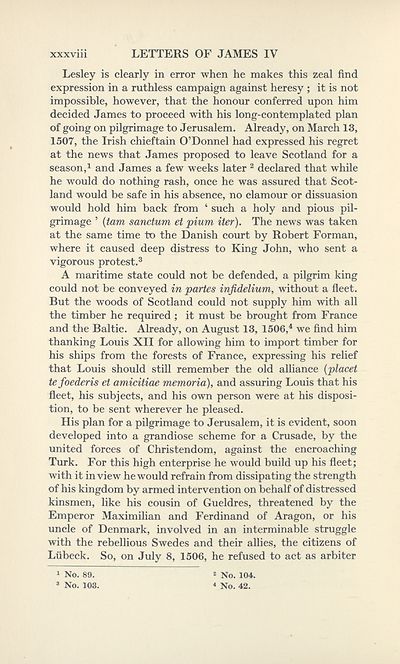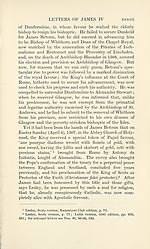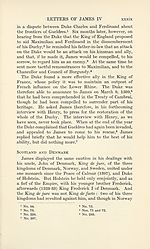Series 3 > Letters of James the Fourth, 1505-1513
(45) Page xxxviii
Download files
Complete book:
Individual page:
Thumbnail gallery: Grid view | List view

xxxviii LETTERS OF JAMES IV
Lesley is clearly in error when he makes this zeal find
expression in a ruthless campaign against heresy ; it is not
impossible, however, that the honour conferred upon him
decided James to proceed with his long-contemplated plan
of going on pilgrimage to Jerusalem. Already, on March 13,
1507, the Irish chieftain O’Donnel had expressed his regret
at the news that James proposed to leave Scotland for a
season,1 and James a few weeks later 2 declared that while
he would do nothing rash, once he was assured that Scot¬
land would be safe in his absence, no clamour or dissuasion
would hold him back from ‘ such a holy and pious pil¬
grimage ’ {tam sanctum et pium iter). The news was taken
at the same time to the Danish court by Robert Forman,
where it caused deep distress to King John, who sent a
vigorous protest.3
A maritime state could not be defended, a pilgrim king
could not be conveyed in partes infidelium, without a fleet.
But the woods of Scotland could not supply him with all
the timber he required ; it must be brought from France
and the Baltic. Already, on August 13, 1506,4 we find him
thanking Louis XII for allowing him to import timber for
his ships from the forests of France, expressing his relief
that Louis should still remember the old alliance (placet
te foederis et amicitiae memoria), and assuring Louis that his
fleet, his subjects, and his own person were at his disposi¬
tion, to be sent wherever he pleased.
His plan for a pilgrimage to Jerusalem, it is evident, soon
developed into a grandiose scheme for a Crusade, by the
united forces of Christendom, against the encroaching
Turk. For this high enterprise he would build up his fleet;
with it in view he would refrain from dissipating the strength
of his kingdom by armed intervention on behalf of distressed
kinsmen, like his cousin of Gueldres, threatened by the
Emperor Maximilian and Ferdinand of Aragon, or his
uncle of Denmark, involved in an interminable struggle
with the rebellious Swedes and their allies, the citizens of
Liibeck. So, on July 8, 1506, he refused to act as arbiter
1 No. 89.
8 No. 103.
s No. 104.
4 No. 42.
Lesley is clearly in error when he makes this zeal find
expression in a ruthless campaign against heresy ; it is not
impossible, however, that the honour conferred upon him
decided James to proceed with his long-contemplated plan
of going on pilgrimage to Jerusalem. Already, on March 13,
1507, the Irish chieftain O’Donnel had expressed his regret
at the news that James proposed to leave Scotland for a
season,1 and James a few weeks later 2 declared that while
he would do nothing rash, once he was assured that Scot¬
land would be safe in his absence, no clamour or dissuasion
would hold him back from ‘ such a holy and pious pil¬
grimage ’ {tam sanctum et pium iter). The news was taken
at the same time to the Danish court by Robert Forman,
where it caused deep distress to King John, who sent a
vigorous protest.3
A maritime state could not be defended, a pilgrim king
could not be conveyed in partes infidelium, without a fleet.
But the woods of Scotland could not supply him with all
the timber he required ; it must be brought from France
and the Baltic. Already, on August 13, 1506,4 we find him
thanking Louis XII for allowing him to import timber for
his ships from the forests of France, expressing his relief
that Louis should still remember the old alliance (placet
te foederis et amicitiae memoria), and assuring Louis that his
fleet, his subjects, and his own person were at his disposi¬
tion, to be sent wherever he pleased.
His plan for a pilgrimage to Jerusalem, it is evident, soon
developed into a grandiose scheme for a Crusade, by the
united forces of Christendom, against the encroaching
Turk. For this high enterprise he would build up his fleet;
with it in view he would refrain from dissipating the strength
of his kingdom by armed intervention on behalf of distressed
kinsmen, like his cousin of Gueldres, threatened by the
Emperor Maximilian and Ferdinand of Aragon, or his
uncle of Denmark, involved in an interminable struggle
with the rebellious Swedes and their allies, the citizens of
Liibeck. So, on July 8, 1506, he refused to act as arbiter
1 No. 89.
8 No. 103.
s No. 104.
4 No. 42.
Set display mode to:
![]() Universal Viewer |
Universal Viewer | ![]() Mirador |
Large image | Transcription
Mirador |
Large image | Transcription
Images and transcriptions on this page, including medium image downloads, may be used under the Creative Commons Attribution 4.0 International Licence unless otherwise stated. ![]()
| Scottish History Society volumes > Series 3 > Letters of James the Fourth, 1505-1513 > (45) Page xxxviii |
|---|
| Permanent URL | https://digital.nls.uk/126697131 |
|---|
| Attribution and copyright: |
|
|---|
| Description | Over 180 volumes, published by the Scottish History Society, containing original sources on Scotland's history and people. With a wide range of subjects, the books collectively cover all periods from the 12th to 20th centuries, and reflect changing trends in Scottish history. Sources are accompanied by scholarly interpretation, references and bibliographies. Volumes are usually published annually, and more digitised volumes will be added as they become available. |
|---|


